Happy 116th Birthday to Tolkien: photos, letter #328, and a reflection.
~*~
John Ronald Reuel Tolkien
January 3, 1892 ~ September 2, 1973

ecause today is Tolkien's birthday, I am posting a few images, a copy of letter #328, and a reflection in his honour.
1. Photos
~ Young J. R. R. Tolkien was known to family and friends by his second name, Ronald. This photo was taken in 1911, when he and his friends at King Edward's School started the secret T.C.B.S. ('Tea Club and Barrovian Society'). Tolkien already was reading in Old and Middle English, and they all were appreciators of Norse saga. He would have been 19 years old, two years after he and Edith Bratt had secretly declared their love for each other. He had tried his hand at verse, and had read and loved the Finnish Kalevala.
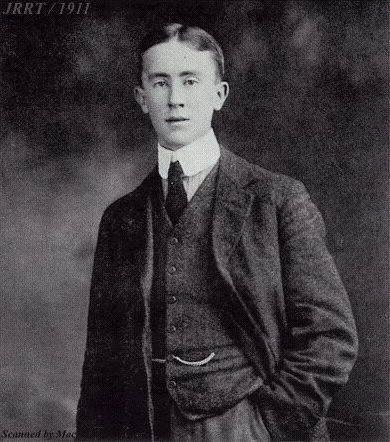
~ This photo shows Tolkien asleep with Christopher behind what must be their Oxford house. Christopher, born in 1924, would have barely been toddling in 1925 when Tolkien was brought to Oxford to be the Rawlinson and Bosworth Professor of Anglo-Saxon. He's still a very small boy in this photograph. I love this picture of the writer I so revere snoozing with the boy who would grow up to be not only a philologist and medievalist in his own right, but, upon Tolkien's death in 1973, his father's literary executor. At eighty-three, Christopher Reuel Tolkien is still bringing his scholarship, understanding and love for his father's work to the task.
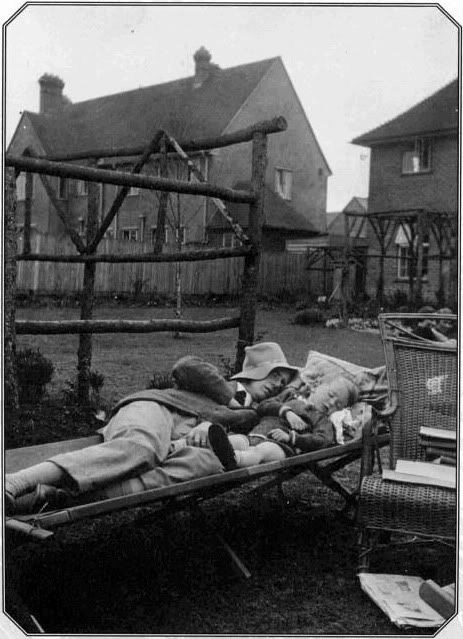
~ A nice photo of Tolkien and his wife Edith taken in their later years.
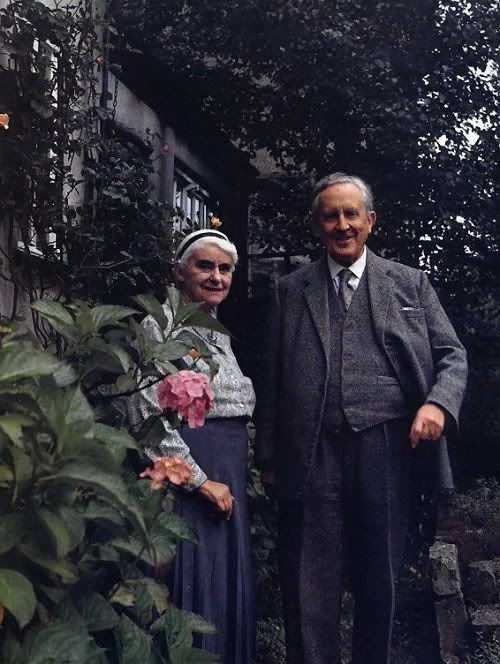
~ One of my favourite "pipe-smoking" shots (very Bilbo- or Gandalf-ish):
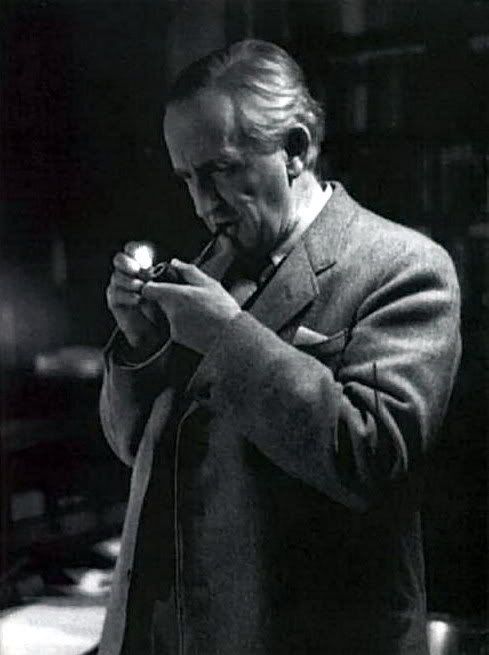
More Tolkien photos may be found in last year's birthday entry,
ERE.
2. Letter #328.
Below is the draft of a letter Tolkien wrote well after The Lord of the Rings was an established success. Roughly dated as "Autumn 1971", it was written a few months before his wife Edith would die (November 29), and two years before his own death. Perhaps he had a sense of things "winding down", but the mood seems to me contemplative, interested in addressing deeper things.
The letter expresses some of Tolkien's thoughts and feelings about his writing, as well as the fate of his work after publication. What he says about writing really strikes a chord with me, which is why I am posting it. I also love the way he answers Mrs. Batten-Phelps comments (implied in his response), with candour, reflection and depth. (I left one paragraph of the published letter out, as it did not pertain as much to his thoughts on writing.)
I've been thinking a lot about writing lately, perhaps because I am not getting much of it done. But this letter speaks to things I've been thinking about. It resonates with me all the more because of the thoughts and ideas aredhelebenesse and jan-u-wine have been exchanging in the comments thread for my previous post. They've been talking about writing, too, and in depth: why they write [fanfiction], how they write, and what they feel about the things they write. How could this letter *not* come to mind?
So, in honour of Tolkien's 116th birthday, here is a letter that talks about writing.
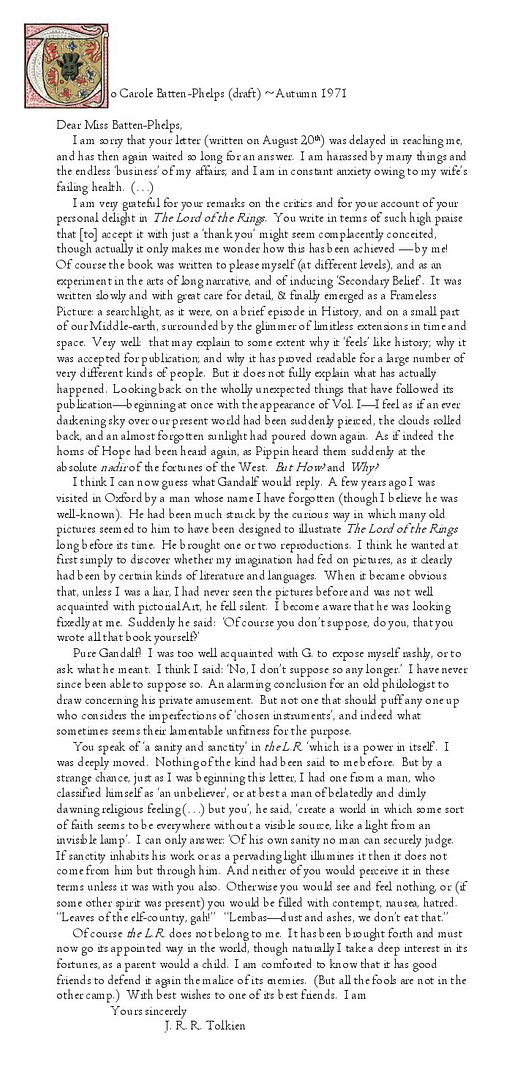
I first read this letter in the spring of 2004. Coincidentally, it was when I was just beginning to read fanfic, something I had never heard of before becoming involved with online fandom in late 2003. I had been feeling a little iffy about the phenomenon, because of the way fic writers took Tolkien's work and made so free with it. Gap-fillers didn't cause me any alarm, but the more...creative stuff gave me pause. How could they do this to Tolkien's work, I asked myself. When I came across this letter at that time, the last passage leapt out at me particularly:
Of course the L.R. does not belong to me. It has been brought forth and must now go its appointed way in the world, though naturally I take a deep interest in its fortunes, as a parent would a child. I am comforted to know that it has good friends to defend it again the malice of its enemies.
I was involved then in a deep discussion with a scholar and excellent writer of fanfic, trying to understand how, as a Tolkien fan, she could write what she wrote (tame stuff, I later found). She argued that Tolkien fans were free to write what they wished, in spite of what would almost certainly be Tolkien's opinions on what they had done with his story, because the text was now public property, as was every published work. Aesthetically, artistically, the work belonged to its readers. If only on the grounds of "applicability", and Tolkien's expressed hope that future writers would add to the "tree of tales" (of which he thought his work was a small part), fans were given his virtual blessing to develop his secondary world as they felt inspired to do.
Yet I kept thinking of that last paragraph. Yes, Tolkien had sent his story out into the world by publishing it, and now it had a life of its own. But, comparing himself to a parent, he said he continued to take "a deep interest in its fortunes", and was comforted to think it was being defended against "the malice of its enemies". This letter to Mrs. Batten-Phelps included a paragraph in which Tolkien thanked her for letting him know she had read his work on the warm recommendation of an old Oxford colleague, a Fellow of Balliol, M. R. Ridley. "Not until I got your letter did I learn that he had done me the honour of placing the works of his old colleague in the ranks of ‘literature’, and gaining me intelligent and well-equipped readers", he wrote of the news. In this context, the "friends" of his child were people like Ridley, the "enemies" critics who had trashed it (and perhaps the cultish American fans who had appalled Tolkien, also mentioned in excised parts of this letter). Tolkien was not talking about fanfiction writers, who practice an art form of which Tolkien had never dreamed.
But if he had known what would be made from his work, what would he think? Agreeing in part with my conversation partner of 2004, I do think that Tolkien actually would be pleased to learn that his work had inspired other writers to enter his world and continue to open it up and out creatively. But not everything they have done with it would please him, I fear. Some things would certainly sadden, even horrify him, if he knew. Were fan writers friends, looking after Tolkien's child, or were they letting it languish while they pursued their own narrative ends? Were they defending it from enemies, or slapping it around, even molesting it? I could not be easy on the matter and continued to read fretfully, chafing at departures from canon.

evertheless, I eventually put my scruples aside and began to write my own fic. I meant to stay true to canon, but I didn't, leading my protagonist almost immediately out of his Tolkien-defined sphere. While I still feel ambivalent about it, I have learned to live with the compromise between trying to be faithful to canon and letting my story have its head. I want to be respectful of Tolkien, yet I want to have my say. I am sure this is not an uncommon feeling for fanfic writers.
In order to prepare for this post, I read letter #328 again. Having effectively made a truce with my feelings about the way I have treated Tolkien's "child", the passage that most spoke to me this time around was the penultimate paragraph. To Mrs. Batten-Phelps statement that she valued "a sanity and sanctity" in LotR which seemed to her to be "a power in itself", Tolkien replied that he was "deeply moved". Such a thing had never before been said to him. He told her then of another conversation he'd had, with a former atheist who said of LotR, "you create a world in which some sort of faith seems to be everywhere without a visible source, like a light from an invisible lamp". Tolkien wrote to Mrs. Phelps,
'Of his own sanity no man can securely judge. If sanctity inhabits his work or as a pervading light illumines it then it does not come from him but through him. And neither of you would perceive it in these terms unless it was with you also. Otherwise you would see and feel nothing, or (if some other spirit was present) you would be filled with contempt, nausea, hatred. “Leaves of the elf-country, gah!” “Lembas-dust and ashes, we don’t eat that.”
Tolkien was not talking about Frodo this time, but conjecturing how light might be perceived as permeating his work. But this passage is so parallel to the way he portrayed the light perceptible in Frodo, I couldn't help seeing a connection.
In a way, Frodo's character is like a metaphor or an icon that points to what Tolkien says here concerning the presence of the transcendent in his writing (or, by extension, in any artistic creation). In Frodo, too, the light could be perceived only by those with eyes to see it. Gandalf, sitting at Frodo's bedside as he recovered from the wound of the Morgul blade, saw it as he slept. Sam saw it as he watched Frodo sleep in Mordor.
In view of this passage, it is interesting that in both instances Frodo is asleep when the "inner light" is seen. For me, this underscores the idea that the light is not Frodo's own, but something that comes through him. It is not affected by his own personality, acts or moods. He is asleep when his light is perceived, apparently peacefully. He isn’t ecstatic or sad; he isn't suffering sacrificially, nor is he in the midst of valourous acts. The light emanates from him when he is doing and feeling relatively nothing. Frodo, as Gandalf said of him, becomes more and more like "a glass filled with a clear light for eyes to see that can." Like the light Tolkien speaks of in his story, Frodo does not himself generate the light: as he was a Ring-bearer, so he is a light-bearer-but not a light-source.
Frodo is, I believe, a figure, or sign, of how Tolkien conjectured light could permeate his story so that it, too, might seem as "a glass filled with clear light". Frodo, the story, and its creator all are vessels through which the same light can be glimpsed. It is their work and gift, their doom and privilege to bear light that is not their own, but which can be seen through them.
Perhaps an artist's job ("Quest"?), at its most profound, is to try to make his or her work such a vessel: transparent, so that the light might be glimpsed through it, even if it is only "for eyes to see that can".
~ Mechtild

~ "Frodo's Meeting With Gildor", by Alan Lee.
John Ronald Reuel Tolkien
January 3, 1892 ~ September 2, 1973
ecause today is Tolkien's birthday, I am posting a few images, a copy of letter #328, and a reflection in his honour.
1. Photos
~ Young J. R. R. Tolkien was known to family and friends by his second name, Ronald. This photo was taken in 1911, when he and his friends at King Edward's School started the secret T.C.B.S. ('Tea Club and Barrovian Society'). Tolkien already was reading in Old and Middle English, and they all were appreciators of Norse saga. He would have been 19 years old, two years after he and Edith Bratt had secretly declared their love for each other. He had tried his hand at verse, and had read and loved the Finnish Kalevala.

~ This photo shows Tolkien asleep with Christopher behind what must be their Oxford house. Christopher, born in 1924, would have barely been toddling in 1925 when Tolkien was brought to Oxford to be the Rawlinson and Bosworth Professor of Anglo-Saxon. He's still a very small boy in this photograph. I love this picture of the writer I so revere snoozing with the boy who would grow up to be not only a philologist and medievalist in his own right, but, upon Tolkien's death in 1973, his father's literary executor. At eighty-three, Christopher Reuel Tolkien is still bringing his scholarship, understanding and love for his father's work to the task.

~ A nice photo of Tolkien and his wife Edith taken in their later years.

~ One of my favourite "pipe-smoking" shots (very Bilbo- or Gandalf-ish):

More Tolkien photos may be found in last year's birthday entry,
ERE.
2. Letter #328.
Below is the draft of a letter Tolkien wrote well after The Lord of the Rings was an established success. Roughly dated as "Autumn 1971", it was written a few months before his wife Edith would die (November 29), and two years before his own death. Perhaps he had a sense of things "winding down", but the mood seems to me contemplative, interested in addressing deeper things.
The letter expresses some of Tolkien's thoughts and feelings about his writing, as well as the fate of his work after publication. What he says about writing really strikes a chord with me, which is why I am posting it. I also love the way he answers Mrs. Batten-Phelps comments (implied in his response), with candour, reflection and depth. (I left one paragraph of the published letter out, as it did not pertain as much to his thoughts on writing.)
I've been thinking a lot about writing lately, perhaps because I am not getting much of it done. But this letter speaks to things I've been thinking about. It resonates with me all the more because of the thoughts and ideas aredhelebenesse and jan-u-wine have been exchanging in the comments thread for my previous post. They've been talking about writing, too, and in depth: why they write [fanfiction], how they write, and what they feel about the things they write. How could this letter *not* come to mind?
So, in honour of Tolkien's 116th birthday, here is a letter that talks about writing.

I first read this letter in the spring of 2004. Coincidentally, it was when I was just beginning to read fanfic, something I had never heard of before becoming involved with online fandom in late 2003. I had been feeling a little iffy about the phenomenon, because of the way fic writers took Tolkien's work and made so free with it. Gap-fillers didn't cause me any alarm, but the more...creative stuff gave me pause. How could they do this to Tolkien's work, I asked myself. When I came across this letter at that time, the last passage leapt out at me particularly:
Of course the L.R. does not belong to me. It has been brought forth and must now go its appointed way in the world, though naturally I take a deep interest in its fortunes, as a parent would a child. I am comforted to know that it has good friends to defend it again the malice of its enemies.
I was involved then in a deep discussion with a scholar and excellent writer of fanfic, trying to understand how, as a Tolkien fan, she could write what she wrote (tame stuff, I later found). She argued that Tolkien fans were free to write what they wished, in spite of what would almost certainly be Tolkien's opinions on what they had done with his story, because the text was now public property, as was every published work. Aesthetically, artistically, the work belonged to its readers. If only on the grounds of "applicability", and Tolkien's expressed hope that future writers would add to the "tree of tales" (of which he thought his work was a small part), fans were given his virtual blessing to develop his secondary world as they felt inspired to do.
Yet I kept thinking of that last paragraph. Yes, Tolkien had sent his story out into the world by publishing it, and now it had a life of its own. But, comparing himself to a parent, he said he continued to take "a deep interest in its fortunes", and was comforted to think it was being defended against "the malice of its enemies". This letter to Mrs. Batten-Phelps included a paragraph in which Tolkien thanked her for letting him know she had read his work on the warm recommendation of an old Oxford colleague, a Fellow of Balliol, M. R. Ridley. "Not until I got your letter did I learn that he had done me the honour of placing the works of his old colleague in the ranks of ‘literature’, and gaining me intelligent and well-equipped readers", he wrote of the news. In this context, the "friends" of his child were people like Ridley, the "enemies" critics who had trashed it (and perhaps the cultish American fans who had appalled Tolkien, also mentioned in excised parts of this letter). Tolkien was not talking about fanfiction writers, who practice an art form of which Tolkien had never dreamed.
But if he had known what would be made from his work, what would he think? Agreeing in part with my conversation partner of 2004, I do think that Tolkien actually would be pleased to learn that his work had inspired other writers to enter his world and continue to open it up and out creatively. But not everything they have done with it would please him, I fear. Some things would certainly sadden, even horrify him, if he knew. Were fan writers friends, looking after Tolkien's child, or were they letting it languish while they pursued their own narrative ends? Were they defending it from enemies, or slapping it around, even molesting it? I could not be easy on the matter and continued to read fretfully, chafing at departures from canon.
evertheless, I eventually put my scruples aside and began to write my own fic. I meant to stay true to canon, but I didn't, leading my protagonist almost immediately out of his Tolkien-defined sphere. While I still feel ambivalent about it, I have learned to live with the compromise between trying to be faithful to canon and letting my story have its head. I want to be respectful of Tolkien, yet I want to have my say. I am sure this is not an uncommon feeling for fanfic writers.
In order to prepare for this post, I read letter #328 again. Having effectively made a truce with my feelings about the way I have treated Tolkien's "child", the passage that most spoke to me this time around was the penultimate paragraph. To Mrs. Batten-Phelps statement that she valued "a sanity and sanctity" in LotR which seemed to her to be "a power in itself", Tolkien replied that he was "deeply moved". Such a thing had never before been said to him. He told her then of another conversation he'd had, with a former atheist who said of LotR, "you create a world in which some sort of faith seems to be everywhere without a visible source, like a light from an invisible lamp". Tolkien wrote to Mrs. Phelps,
'Of his own sanity no man can securely judge. If sanctity inhabits his work or as a pervading light illumines it then it does not come from him but through him. And neither of you would perceive it in these terms unless it was with you also. Otherwise you would see and feel nothing, or (if some other spirit was present) you would be filled with contempt, nausea, hatred. “Leaves of the elf-country, gah!” “Lembas-dust and ashes, we don’t eat that.”
Tolkien was not talking about Frodo this time, but conjecturing how light might be perceived as permeating his work. But this passage is so parallel to the way he portrayed the light perceptible in Frodo, I couldn't help seeing a connection.
In a way, Frodo's character is like a metaphor or an icon that points to what Tolkien says here concerning the presence of the transcendent in his writing (or, by extension, in any artistic creation). In Frodo, too, the light could be perceived only by those with eyes to see it. Gandalf, sitting at Frodo's bedside as he recovered from the wound of the Morgul blade, saw it as he slept. Sam saw it as he watched Frodo sleep in Mordor.
In view of this passage, it is interesting that in both instances Frodo is asleep when the "inner light" is seen. For me, this underscores the idea that the light is not Frodo's own, but something that comes through him. It is not affected by his own personality, acts or moods. He is asleep when his light is perceived, apparently peacefully. He isn’t ecstatic or sad; he isn't suffering sacrificially, nor is he in the midst of valourous acts. The light emanates from him when he is doing and feeling relatively nothing. Frodo, as Gandalf said of him, becomes more and more like "a glass filled with a clear light for eyes to see that can." Like the light Tolkien speaks of in his story, Frodo does not himself generate the light: as he was a Ring-bearer, so he is a light-bearer-but not a light-source.
Frodo is, I believe, a figure, or sign, of how Tolkien conjectured light could permeate his story so that it, too, might seem as "a glass filled with clear light". Frodo, the story, and its creator all are vessels through which the same light can be glimpsed. It is their work and gift, their doom and privilege to bear light that is not their own, but which can be seen through them.
Perhaps an artist's job ("Quest"?), at its most profound, is to try to make his or her work such a vessel: transparent, so that the light might be glimpsed through it, even if it is only "for eyes to see that can".
~ Mechtild

~ "Frodo's Meeting With Gildor", by Alan Lee.